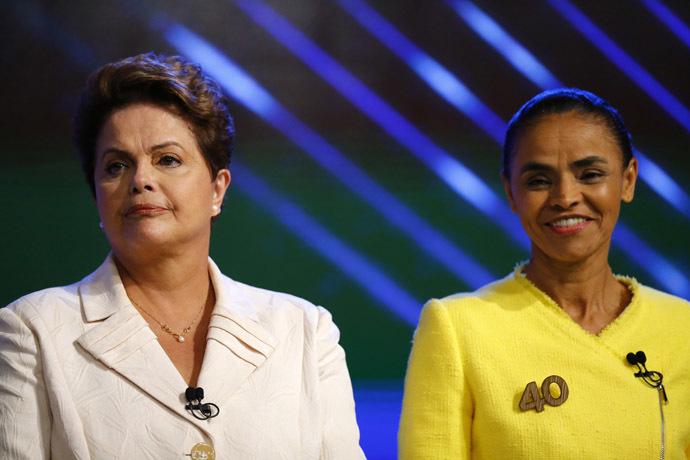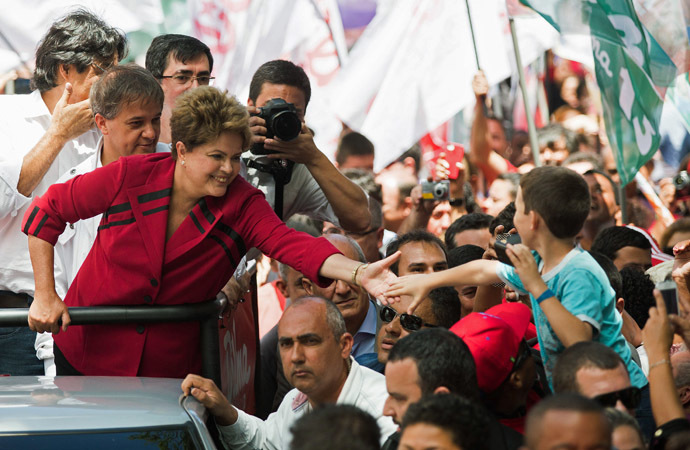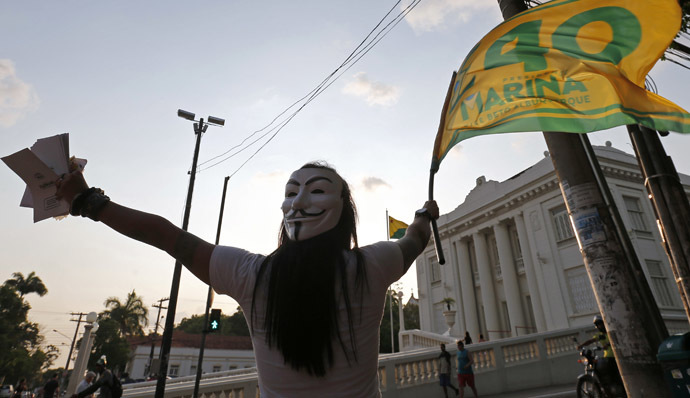Rousseff favored for re-election as dramatic campaign wraps up in Brazil
Despite a divisive four years in charge, incumbent center-left Brazilian President Dilma Rousseff is the front-runner in the country’s Sunday elections. Her once closest rival in the race, Marina Silva, will now have to fight for second place, polls say.
Most key Brazilian politicians face a public test on Sunday, as
more than 140 million voters are eligible to elect a new lower
house of parliament and new regional governors, as well as a
president.
A survey published on Saturday by polling firm MDA placed
Rousseff – once a radical Marxist activist who spent time in
jail, but now a conciliatory mainstream politician – at 40.6
percent of the vote. Right-winger Aecio Neves came second with 24
percent, and environmentalist Marina Silva placed third with 21.4
percent.
The figures will make for desultory reading for the reeling
Silva, who only several weeks ago was within touching distance of
Rousseff. The 66-year-old Brazilian leader has been accused of
corruption and economic mismanagement during the heated political
campaign.
Silva came to widespread national prominence when her senior
socialist running mate Eduardo Campos, an outsider at the time,
died in a plane crash on August 13. A devout
Christian mixed-race Amazonian from a family of rubber tappers,
she offered the perfect personal narrative for disempowered
Brazilians in one of the world’s strikingly unequal states.
Meanwhile, her pro-business economic policies have appealed to
the middle classes, which feel that the country’s economy – which
is predicted to grow by only 0.5 percent this year – needs to be
kickstarted. The prediction of growth for Brazil is currently one
of the worst in South America.
However, Rousseff has staged a spirited fightback, pulling no
punches in a campaign that has become increasingly personal and
negative. Silva’s credibility was attacked over issues as wide
ranging as her inconsistent political affiliations – she has
changed three parties in five years, her support for GM crops,
and her flip-flopping over gay marriage, which she initially
endorsed, only to backtrack later.

As the two leading candidates have attacked each other, chances
have soared for a surprise run-off place for Aecio Neves, a
conservative politician whose grandfather was himself a president
of the country.
So far, neither Neves nor Silva have said they will help endorse
each other if they make it to the October 26 run-off against
Rousseff, despite making similar calls for economic reform.
Meanwhile, Rousseff has trumpeted her achievements, which have
included rapidly shrinking poverty and low unemployment.

There are predictions that 28 different parties will make it into
the 513-seat legislative assembly, ensuring that any president
will be forced to deal with dynamic and fractious coalitions when
trying to pass laws during the next four-year term.
Meanwhile, the gubernatorial race votes will likely reflect the
wide social and economic differences throughout the country – but
as elsewhere in Brazilian politics, the appeal of outsize
personalities with populist agendas will often override
traditional ideological affiliations.














